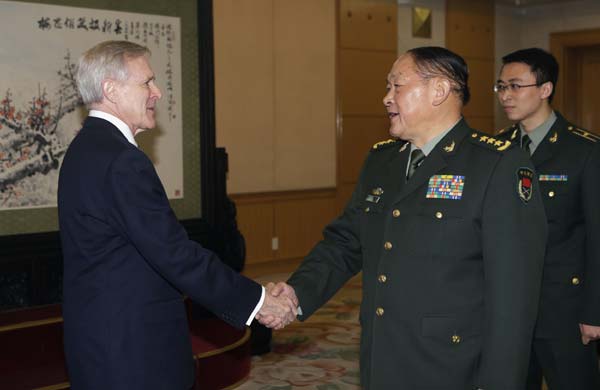Navy chiefs' meeting highlights China's openness
Updated: 2012-11-28 07:57
By Li Xiaokun and Zhao Shengnan (China Daily)
|
||||||||
Beijing's navy chief briefs US on aircraft carrier and landing tests
China's navy chief on Tuesday briefed the US secretary of the Navy on test trials of the country's first aircraft carrier and the successful aircraft landing tests, which Beijing recently confirmed.
Ray Mabus' visit to China is the first by a US secretary of the navy in 28 years. The visit shows China's sincerity to improve military ties with the US and Beijing's growing transparency and confidence, experts said.
 |
|
Defense Minister Liang Guanglie (right) shakes hands with United States Secretary of the Navy Ray Mabus during a meeting at the Bayi Building in Beijing on Tuesday. Jason Lee / Reuters |
The meeting came two days after China confirmed it successfully landed planes on its newly commissioned aircraft carrier.
The talks between the two senior officials also touched upon navigation freedom in the South China Sea, according to a news release issued by Chinese navy.
Zhang Junshe, a researcher from the Naval Military Studies Research Institute, said China's arrangements for Mabus' visit, which seem more open and transparent compared with previous ones of high-ranking US military officials, "show China's sincerity to improve military ties with the US".
"It also reflects the increasing transparency of the Chinese navy, and its growing confidence," Zhang said.
China does not want to see maritime security threatened by a lack of mutual trust from the normal buildup of the Chinese military, Commander in Chief of the People's Liberation Army Navy Wu Shengli told Mabus.
Beijing is committed to completing a China-US maritime military security consultation mechanism and expects to avoid "accidents at sea, misunderstandings and misjudgments", Wu said.
The US has expressed concern over China's military buildup and China's maritime disputes with its neighbors, which have escalated tensions this year.
China has viewed Washington's moves to increase its military presence in the Asia-Pacific as a measure of containment.
Building an equal and mutually beneficial China-US relationship is a choice that "people of the two countries and the world at large most want to see", Wu said.
Defense Minister Liang Guanglie told Reuters before meeting Mabus that "the Chinese military must develop, but there's no 'worry' or 'fear' as the outside world says".
"We should develop the ties between us, between our two militaries, touch on some of our differences, resolve conflicting views," Liang said.
During the talks, Liang proposed that the two sides create policies that suit the development of relations between the two militaries and "effectively manage disparities when conflicts appear".
Whether a military is viewed as a threat should be determined by its strategy, not how powerful it is, said naval scholar Zhang Junshe.
"And we cannot say that the US pivot to Asia has not contributed to rising maritime tensions in the region this year," he added.
Mabus told Liang that a strong, reliable and stable military relationship is very important for Sino-US ties. They also discussed maritime security.
The two sides agreed to deepen exchanges in areas including anti-piracy efforts and joint drills.
During his four-day tour, Mabus will also travel to East China's Ningbo City, where the headquarters of the East China Sea Fleet is based, to visit a new Chinese frigate and conventional power submarine.
"Despite sometimes bellicose attitudes on both sides, there is also a growing push for greater contact and communication to avoid misunderstandings and build trust," The Associated Press said on Tuesday in a report about the meeting.
Chinese and US officers are conducting joint humanitarian assistance and disaster relief operations in Chengdu, capital of Southwest China's Sichuan province this week.
Niu Xinchun, vice-president of the Institute of American Studies at the China Institutes of Contemporary International Relations, said with the rising capacity of the Chinese military, the US military is now facing a new issue on how to coexist with the PLA in the Asia-Pacific.
"The US used to be the only dominant force in the region. And the Pentagon is not used to a stronger Chinese military with an expanded sphere of activity," Niu said.
Now that the two militaries must coexist in the region, both sides should focus on areas of common interest and make efforts to formulate a system to manage potential crises.
"But whether all these can be realized is based on how much they trust each other," he said.
Contact the writers at lixiaokun@chinadaily.com.cn and zhaoshengnan@chinadaily.com.cn

 Relief reaches isolated village
Relief reaches isolated village
 Rainfall poses new threats to quake-hit region
Rainfall poses new threats to quake-hit region
 Funerals begin for Boston bombing victims
Funerals begin for Boston bombing victims
 Quake takeaway from China's Air Force
Quake takeaway from China's Air Force
 Obama celebrates young inventors at science fair
Obama celebrates young inventors at science fair
 Earth Day marked around the world
Earth Day marked around the world
 Volunteer team helping students find sense of normalcy
Volunteer team helping students find sense of normalcy
 Ethnic groups quick to join rescue efforts
Ethnic groups quick to join rescue efforts
Most Viewed
Editor's Picks

|

|

|

|

|

|
Today's Top News
Health new priority for quake zone
Xi meets US top military officer
Japan's boats driven out of Diaoyu
China mulls online shopping legislation
Bird flu death toll rises to 22
Putin appoints new ambassador to China
Japanese ships blocked from Diaoyu Islands
Inspired by Guan, more Chinese pick up golf
US Weekly

|

|






